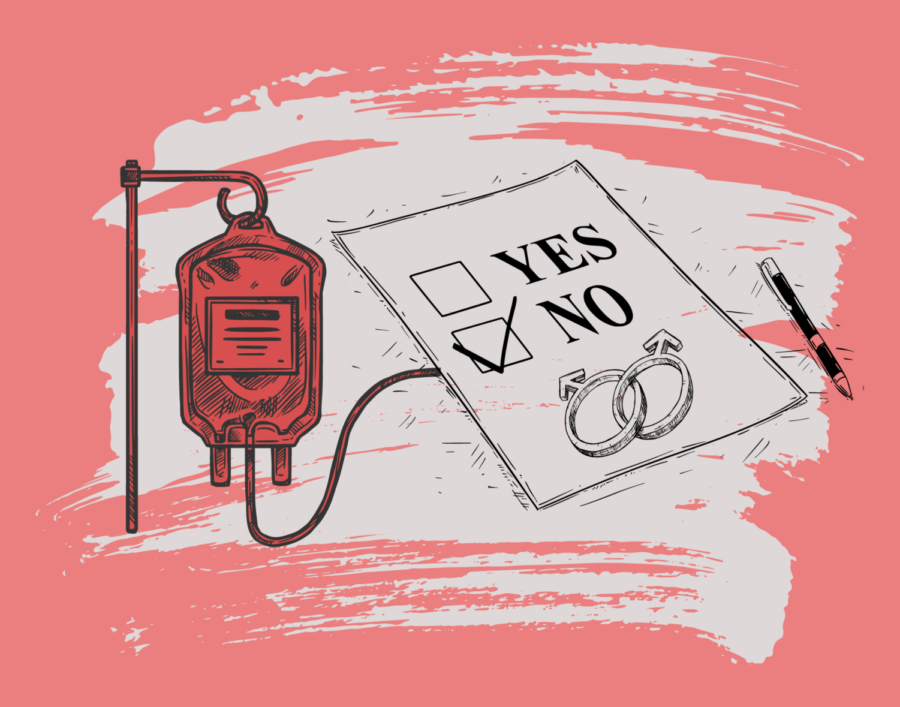Protestors playing God: Why we should still donate blood despite discriminatory policies
The FDA mandates that LGBTQ+ men be celibate for three months before donating blood, a ban that many find discriminatory and rooted in outdated science.
April 21, 2022
In the almost 150 years since its founding, the American Red Cross has never declared a national blood crisis — until now. In January, the organization announced that the country has faced a “10% overall blood donation decline since March 2020” due in part to a lack of donors, blood drive cancellations and staff shortages due to COVID-19.
In accordance with the Food and Drug Administration (FDA), the Red Cross maintains stipulations to determine who can safely donate. Ineligible health conditions include hemophilia, which would endanger the donor, or those with a bloodborne illness like malaria, which cannot be reliably tested for, thus risking the life of the recipient.
But one eligibility rule is rooted not in science, but discrimination.
Outdated research fuels modern-day stigma
During the AIDS epidemic, men who have sex with other men (MSM) were banned from blood donation in 1983 by the FDA to prevent the spread of HIV, which is transmitted through contact with certain bodily fluids from an infected person with a detectable viral load. At the time, correlations were drawn that MSM were more prone to be HIV-positive than other populations. However, the epidemic also created widespread hysteria and the psuedoscientific presumption that MSM do not engage in safe sex.
Today, almost 40 years later, the FDA still categorizes MSM sexual behavior as “high risk” and demands MSM donors abstain from sexual intercourse for three months before donating—a decision that only serves to perpetuate social stigma and homophobic rhetoric. Even though donated blood is already tested for sexually transmitted infections before use, the deferral was created due to the claim that HIV cannot be reliably detected during the first three months of infection.
Current scientific understanding disproves this claim. For example, Nucleic Acid Testing (NAT) is a molecular technique for screening blood donations that has existed since the late 1990s. With the ability to reliably detect a person infected with conditions including HIV within a 3-month period, the need for a deferral is eliminated.
At the very least, if the FDA refuses to lift the deferral, it should be indiscriminate rather than singling out one population. Research shows that since 2014, there has been more than a 71% fall in the number of gay and bisexual men who have HIV, according to The Guardian. Furthermore, in 2020, UK government data showed that more heterosexual people were diagnosed with HIV than gay and bisexual men.
Using patients as pawns
There are past examples of activists arguing for a boycott of blood donations in order to force the FDA or other equivalent national organizations to lift their restrictions on MSM donors. But this form of protest is futile at best, and deadly at worst. Blood is an undeniable necessity and patients without access to transfusions die every day.
One instance is in March 2007, when Iowa State University Greek life students boycotted on-campus blood drives to protest the then-lifetime ban on gay men donating blood.
“Iowa blood supplies are low because drives were canceled during last week’s snowstorm. The ISU blood drive is one of the largest student drives in the nation, [and] the difference of a few hundred units could be felt in hospitals across the state,” the Des Moines Register Editorial Board argued.
To counter the boycott, the Blood Center of Iowa encouraged donations while passing out cards detailing contact information for students to directly voice their opposition to the FDA.
However, in comparison to metrics from previous years, the protest inhibited the donation of an estimated 500 pints of blood.
More recently, in 2020, the Dublin City University Student Union boycotted all blood drives on campus in order to protest the Irish MSM deferral of one year of celibacy.
“I feel as though DCUSU’s decision to ‘not liaise with the Irish Blood Transfusion Service (IBTS) on [organizing] blood drives’ will significantly harm donor numbers,” Criodán Ó Murchú argued for the Irish youth news website Spunout. “That is not a risk I think is worth taking and takes away from the good-natured intent of blood donations in the first place – to help people.”
Some areas such as Hong Kong have eased restrictions. In 2017, it eased the lifetime ban on MSM from donating blood to a one-year deferral. But in a Sept. 2017 opinions piece for the South China Morning Post, Yonden Lhatoo stated that it was illogical to demand abstinence for any period of time, since there is no scientific way of proving celibacy, yet supported blood boycotts.
“Gay people in [Hong Kong] should turn the tables on this bigotry by boycotting blood donations. Don’t bother to give blood – it’s obvious they don’t deserve your help and your good intentions are wasted on them,” he said.
Everyone is entitled to their own bodily autonomy and should have the choice of whether they want to donate. But using ill or disabled patients as leverage, whether to promote LGBTQ+ equality or denounce it, puts lives on the line.
Striving for equality
However, progress is being made toward lifting the MSM ban in the US. The American Red Cross, which oversees the majority of the country’s blood drives, has publicly denounced the deferral period.
Soumya Appalla, a senior at Amador Valley High School and the blood services coordinator for the East Bay Youth Executive Board of the American Red Cross, explained that although “the Red Cross cannot make any changes [to eligibility requirements] unless the FDA approves them, it [is currently] campaigning, working with minority groups and also working hand-in-hand with the FDA to change policies.”
One step toward inclusivity began in Dec. 2020, when the FDA funded an ongoing study with the Red Cross, OneBlood and LGBTQ+ community health organizations that could potentially end the deferral policy.
“[The study] focused on evaluating alternatives [such as] providing data that would help the FDA determine if donor history questionnaires would be as effective as a time-based deferral in reducing the risk of sexually transmitted diseases like HIV,” Appalla said.
As the study progresses, it’s vital to continue holding blood drives while spreading awareness of this ongoing discrimination.
Dougherty Valley High School held a blood drive on March 24. Some students who donated, such as senior Shreya Sripada, were unaware of the deferral period prior to filling out the patient questionnaire.
“When I was filling out the [donor] form, there were a lot of questions about males having sex with another male. The way they were asking questions was a little homophobic [and] it felt a little targeted,” stated Sripada. “The fact is donating blood saves lives. The patients that are receiving blood have nothing to do with the questions that are presented in the questionnaire.”
According to the Williams Institute, if the FDA were to lift donor bans for men who have sex with men, 345,400 to 615,300 more pints of blood would be collected annually. This is the equivalent of up to 200,000 potentially life-saving transfusions.
Many of these men would be more than willing to donate. In 2012, Michael Hernandez petitioned for the FDA to lift the ban.
“For a gay man like myself, the choice between expressing our love physically and remaining eligible blood donors can be among the most difficult,” he said.
These men are being denied the chance to do a good service to their communities. But at the same time, those who encourage blood drive boycotts are making a choice that no one should; for patients in critical need of transfusions, their decision to protest is the difference between life and death. During this crisis, it has never been more imperative to donate blood. But we cannot ignore those who have been denied this right and must work to repair the damage caused to the LGBTQ+ community.






